| Listing 1 - 10 of 48 | << page >> |
Sort by
|
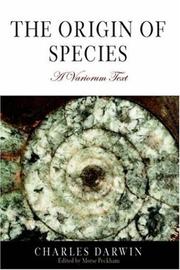
ISBN: 0812219546 Year: 2006 Publisher: Philadelphia University of Pennsylvania Press
Abstract | Keywords | Export | Availability | Bookmark
 Loading...
Loading...Choose an application
- Reference Manager
- EndNote
- RefWorks (Direct export to RefWorks)
Book
ISBN: 1412352576 Year: 2006 Publisher: Chicoutimi, Quebec : J.-M. Tremblay,
Abstract | Keywords | Export | Availability | Bookmark
 Loading...
Loading...Choose an application
- Reference Manager
- EndNote
- RefWorks (Direct export to RefWorks)
Evolution (Biology) --- Natural selection. --- Selection, Genetic.
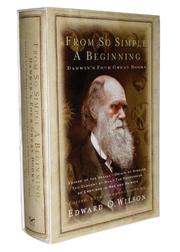
ISBN: 0393061345 Year: 2006 Publisher: New York (N.Y.) : Norton,
Abstract | Keywords | Export | Availability | Bookmark
 Loading...
Loading...Choose an application
- Reference Manager
- EndNote
- RefWorks (Direct export to RefWorks)
Emotions. --- Evolution (Biology). --- Human beings --- Natural selection. --- Origin. --- Beagle Expedition
Book
ISBN: 2895443203 1435698673 9781435698673 9782895443209 Year: 2006 Publisher: Quebec : Editions MultiMondes,
Abstract | Keywords | Export | Availability | Bookmark
 Loading...
Loading...Choose an application
- Reference Manager
- EndNote
- RefWorks (Direct export to RefWorks)
Evolution (Biology) --- Natural selection. --- Darwinism --- Selection, Natural --- Genetics --- Variation (Biology) --- Biological invasions --- Heredity --- Religious aspects.
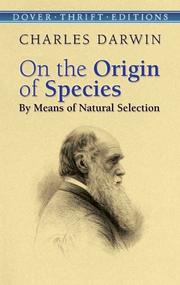
ISBN: 9780486450063 9780486450063 0486450066 0486450066 Year: 2006 Publisher: Mineola, NY: Dover,
Abstract | Keywords | Export | Availability | Bookmark
 Loading...
Loading...Choose an application
- Reference Manager
- EndNote
- RefWorks (Direct export to RefWorks)
Biological Evolution --- Selection, Genetic --- Évolution (Biologie) --- Variation (Biologie) --- Sélection naturelle --- Homme --- Evolution (Biology) --- Natural selection --- Evolution
Book
ISBN: 2100495607 9782100495603 Year: 2006 Publisher: Paris : Dunod,
Abstract | Keywords | Export | Availability | Bookmark
 Loading...
Loading...Choose an application
- Reference Manager
- EndNote
- RefWorks (Direct export to RefWorks)
Biology --- Evolution (Biology) --- Biologie --- Evolution (Biologie) --- Philosophy --- Philosophie --- Évolution (Biologie) --- Natural selection. --- Néo-darwinisme. --- Darwinisme. --- Philosophy. --- Philosophie. --- Biologie - Philosophie --- Évolution (Biologie) - Philosophie
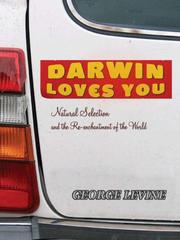
ISBN: 0691126631 9780691126630 9780691136394 Year: 2006 Publisher: Princeton Princeton university press
Abstract | Keywords | Export | Availability | Bookmark
 Loading...
Loading...Choose an application
- Reference Manager
- EndNote
- RefWorks (Direct export to RefWorks)
Jesus and Darwin do battle on car bumpers across America. Medallions of fish symbolizing Jesus are answered by ones of amphibians stamped "Darwin," and stickers proclaiming "Jesus Loves You" are countered by "Darwin Loves You." The bumper sticker debate might be trivial and the pronouncement that "Darwin Loves You" may seem merely ironic, but George Levine insists that the message contains an unintended truth. In fact, he argues, we can read it straight. Darwin, Levine shows, saw a world from which his theory had banished transcendence as still lovable and enchanted, and we can see it like that too--if we look at his writings and life in a new way. Although Darwin could find sublimity even in ants or worms, the word "Darwinian" has largely been taken to signify a disenchanted world driven by chance and heartless competition. Countering the pervasive view that the facts of Darwin's world must lead to a disenchanting vision of it, Levine shows that Darwin's ideas and the language of his books offer an alternative form of enchantment, a world rich with meaning and value, and more wonderful and beautiful than ever before. Without minimizing or sentimentalizing the harsh qualities of life governed by natural selection, and without deifying Darwin, Levine makes a moving case for an enchanted secularism--a commitment to the value of the natural world and the human striving to understand it.
Civilization, Secular. --- Civilization, Secular --- Natural selection --- Social Darwinism --- Darwinism, Social --- Competition --- Social change --- Social conflict --- Social evolution --- Darwinism --- Selection, Natural --- Genetics --- Variation (Biology) --- Biological invasions --- Evolution (Biology) --- Heredity --- Secularism --- Darwin, Charles, --- Darwin, Charles, Robert --- Influence. --- Philosophy of nature --- Evolution. Phylogeny --- Darwin, Charles --- Natural selection. --- Social Darwinism. --- Secular civilization
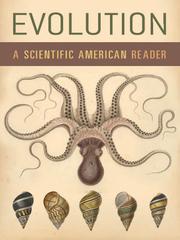
ISBN: 0226742733 1281966428 9786611966423 9780226742731 0226742687 0226742695 9780226742694 9780226742687 Year: 2006 Publisher: Chicago University of Chicago Press
Abstract | Keywords | Export | Availability | Bookmark
 Loading...
Loading...Choose an application
- Reference Manager
- EndNote
- RefWorks (Direct export to RefWorks)
From the Scopes "Monkey Trial" of 1925 to the court ruling against the Dover Area School Board's proposed intelligent design curriculum in 2005, few scientific topics have engendered as much controversy-or grabbed as many headlines-as evolution. And since the debate shows no signs of abating, there is perhaps no better time to step back and ask: What is evolution? Defined as the gradual process by which something changes into a different and usually more complex and efficient form, evolution explains the formation of the universe, the nature of viruses, and the emergence of humans. A first-rate summary of the actual science of evolution, this Scientific American reader is a timely collection that gives readers an opportunity to consider evolution's impact in various settings. Divided into four sections that consider the evolution of the universe, cells, dinosaurs, and humans, Evolution brings together more than thirty articles written by some of the world's most respected evolutionary scientists. As tour guides through the genesis of the universe and complex cells, P. James E. Peebles examines the evidence in support of an expanding cosmos, while Christian de Duve discusses the birth of eukaryotes. In an article that anticipated his book Full House, Stephen Jay Gould argues that chance and contingency are as important as natural selection for evolutionary change. And Ian Tatersall makes two fascinating contributions, submitting his view that the schematic of human evolution looks less like a ladder and more like a bush. With the latest on what's being researched at every level of evolutionary studies, from prospects of life on other planets to the inner working of cells, Evolution offers general readers an opportunity to update their knowledge on this hot topic while giving students an introduction to the problems and methodologies of an entire field of inquiry.
Evolution (Biology) --- Animal evolution --- Animals --- Biological evolution --- Darwinism --- Evolutionary biology --- Evolutionary science --- Origin of species --- Biology --- Evolution --- Biological fitness --- Homoplasy --- Natural selection --- Phylogeny --- scientific american reader, evolution, evolutionary, science, scientists, monkey trial, scopes, intelligent design, debate, curriculum, controversy, formation, universe, development, virus, humanity, cells, dinosaurs, cosmos, eukaryotes, natural selection, change, biology, biological, solar systems, big bang, earth, neandertals.

ISBN: 9780226668376 9780226668369 0226668371 0226668363 9780226668352 0226668355 Year: 2006 Publisher: Chicago (Ill.) University of Chicago press
Abstract | Keywords | Export | Availability | Bookmark
 Loading...
Loading...Choose an application
- Reference Manager
- EndNote
- RefWorks (Direct export to RefWorks)
Philosophy of science --- General ethics --- Evolution (Biology) --- Evolution (Biology). --- Animal evolution --- Animals --- Biological evolution --- Darwinism --- Evolutionary biology --- Evolutionary science --- Origin of species --- Biology --- Evolution --- Biological fitness --- Homoplasy --- Natural selection --- Phylogeny
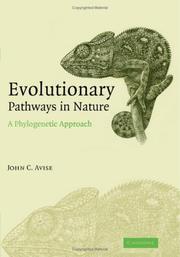
ISBN: 0521857538 0521674174 9780521857536 9780521674171 9780511606939 0511219318 9780511219313 9780511221286 0511221282 0511219997 9780511219993 0511220510 9780511220517 0511606931 128048022X 9781280480225 1107166748 9786610480227 0511324251 Year: 2006 Publisher: Cambridge Cambridge University Press
Abstract | Keywords | Export | Availability | Bookmark
 Loading...
Loading...Choose an application
- Reference Manager
- EndNote
- RefWorks (Direct export to RefWorks)
Reconstructing phylogenetic trees from DNA sequences has become a popular exercise in many branches of biology, and here the well-known geneticist John Avise explains why. Molecular phylogenies provide a genealogical backdrop for interpreting the evolutionary histories of many other types of biological traits (anatomical, behavioral, ecological, physiological, biochemical and even geographical). Guiding readers on a natural history tour along dozens of evolutionary pathways, the author describes how creatures ranging from microbes to elephants came to possess their current phenotypes. Essential reading for college students, professional biologists and anyone interested in natural history and biodiversity, this book is packed with fascinating examples of evolutionary puzzles from across the animal kingdom; how the toucan got its enormous bill, how reptiles grow back lost limbs and why Arctic fish don't freeze.
Evolution (Biology). --- Phylogeny. --- molecular phylogeny --- evolutionary ecology --- evo-devo (evolutionary developmental biology) --- Evolution (Biology) --- Animal evolution --- Animals --- Biological evolution --- Darwinism --- Evolutionary biology --- Evolutionary science --- Origin of species --- Biology --- Evolution --- Biological fitness --- Homoplasy --- Natural selection --- Phylogeny --- Animal phylogeny --- Phylogenetics --- Phylogeny (Zoology)
| Listing 1 - 10 of 48 | << page >> |
Sort by
|

 Search
Search Feedback
Feedback About UniCat
About UniCat  Help
Help News
News